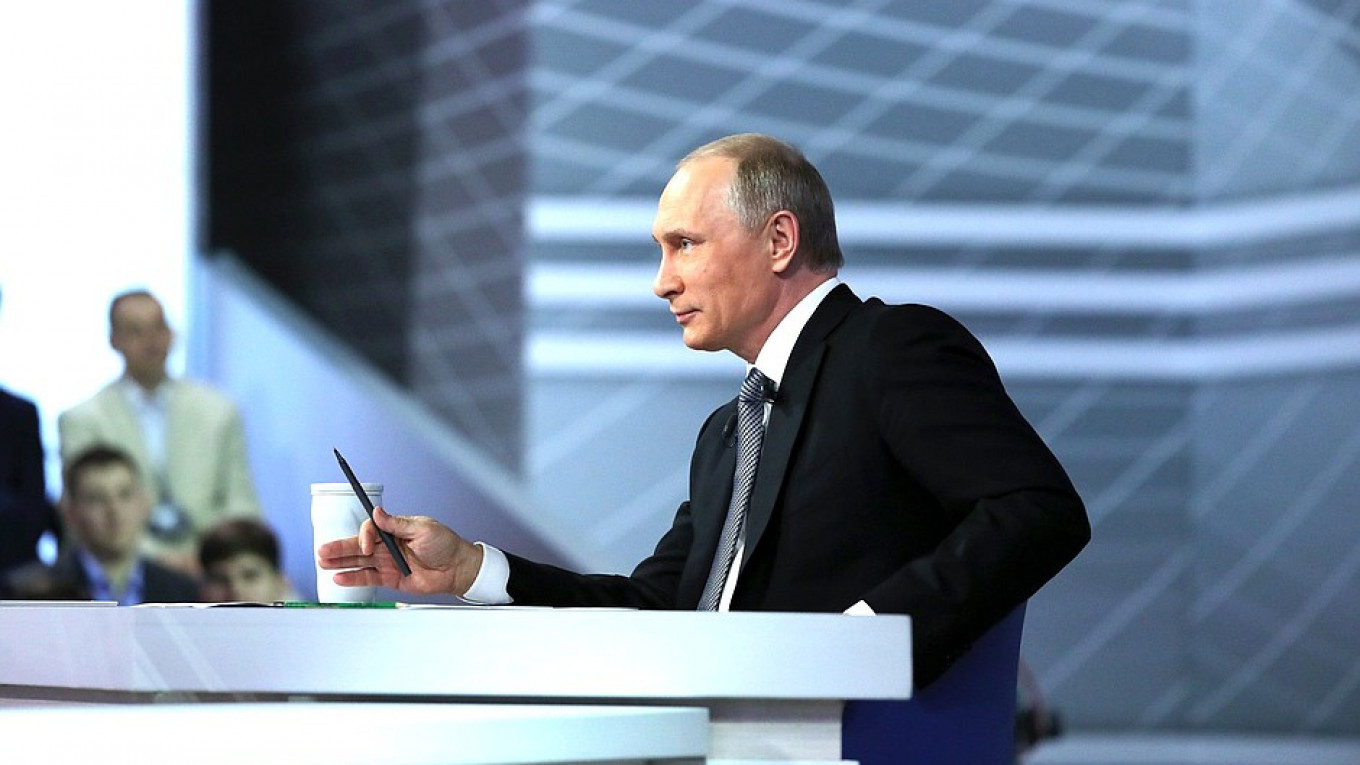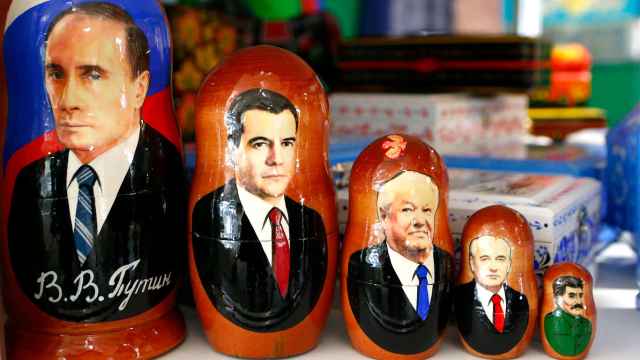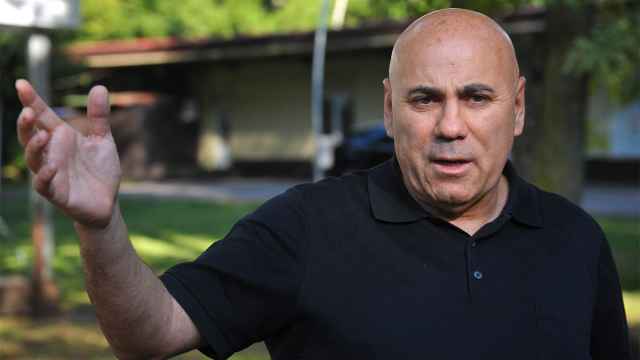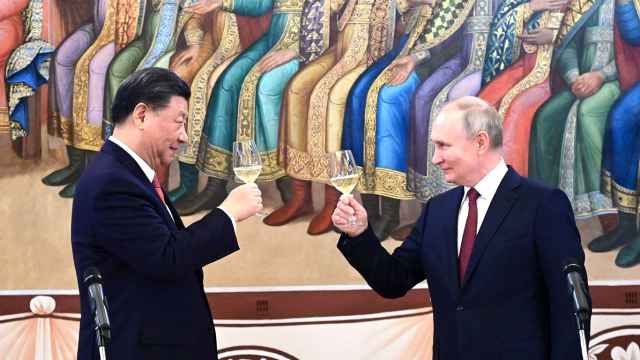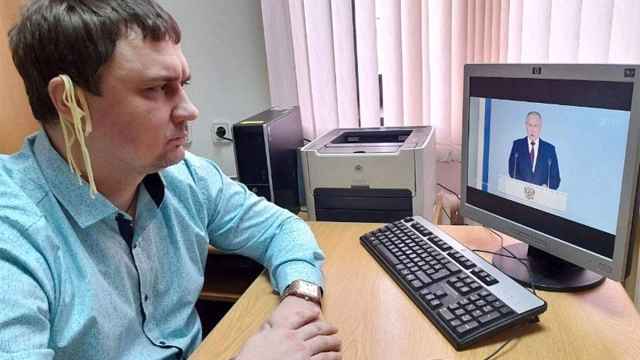Civil unrest and falling living standards are likely to dominate Vladimir Putin’s annual televised national phone-in on Thursday, depriving the Russian president of the opportunity to concentrate on foreign policy and forcing him to confront domestic problems.
In the past few months, Russia has seen mass protests over the framing of an investigative reporter, the planned construction of a church in Yekaterinburg’s central park and plans to build landfill sites in the north for Moscow’s trash.
Economists predict that real incomes are set to fall for the sixth consecutive year in 2019, and the government in January raised the pension age by five years. Add to that a rare setback for the ruling United Russia party in last year’s regional elections, and Putin’s trust ratings have dropped to their lowest levels since 2006.
“Putin finds himself in a much more difficult situation than last year,” independent political analyst Dmitry Oreshkin told The Moscow Times. “There have been few real achievements domestically since last year’s call. The president won’t have any genuine bragging rights.”
Russia’s Perviy Kanal (Channel One) state television station, which broadcasts the event, said on Monday that this year’s most popular topics would be pensions, social support, ecology and healthcare. The phone-in format allows ordinary Russians from across the country to ask Putin questions by phone, email, instant messenger or video in a session that can last for as long as four hours.
The lack of public interest in foreign policy topics might put Putin in a difficult position, Oreshkin said.
“Putin loves talking about grand geopolitical issues; that is when he is in his element, it is what makes him tick. However, he must know that few people this year are waiting for any sort of war rhetoric.”
Recent polls by the independent Levada Center indicated that the share of Russians who see the United States and Ukraine as enemies has fallen sharply. Explaining the results, Levada’s director, Lev Gudkov, told the business daily Vedomosti that “people are tired of mobilizing and feeling threatened by war.”
Konstantin Gaaze, a sociologist at the Moscow Carnegie Center, told The Moscow Times that he believes that "more than ever" the call will focus on socio-economic issues.
“For the president, it will be crucial to show that he is on the side of the people and not the local officials, who many blame for their misfortunes,” he said.
Gaaze said he believes Putin will try to play the “good tsar and bad boyars card,” referring to a popular historical perception that Russia’s ills stem from the actions of officials who hide the truth from the leader. This tactic, however, might backfire as recent polls have shown that most Russians hold Putin personally responsible for the problems the country is facing under his rule.
Gleb Pavlovsky, a former Kremlin adviser turned critic, said he’ll be watching closely to see what tone Putin adopts during the call.
“Logically, given Putin’s alarming ratings, we should expect him to be empathic and understanding toward the complaints he will receive. But not many know anymore what goes through his mind, so all bets are off,” Pavlovsky told The Moscow Times.
Nevertheless, the annual call-in presents Putin with an opportunity to show the public as well as various elites that he is still the “the leader who calls the shots,” at a time when his authority has been questioned, Gaaze said.
He added that the arrest and release earlier this month of Russian investigative reporter Ivan Golunov after trumped-up drug charges were dropped represented an unprecedented U-turn by the Kremlin, challenging the notion that the president has full control over his security services.
“The call-in provides a perfect platform to show that he is still relevant, fit and ready to fight,” Gaaze said.
On the heels of Golunov, authorities also this week released Leonid Volkov, an aide to opposition leader Alexei Navalny, and Igor Rudnikov, a journalist who had been facing extortion charges.
While Pavlovsky and Oreshkin cautioned against linking these releases to Thursday’s phone-in, both said Putin is likely to award himself credit for the way he handled the Golunov case.
“It was one of the few instances where he managed to show he was on the side of the people,” said Oreshkin.
Despite the changing circumstances, experts doubt that Thursday's call-in will be radically different from previous ones.
“It’s a ritual. And the point of rituals is that they repeat and don’t change, giving the public a sense of continuity and stability,” said political scientist Yekaterina Schulmann.
Alexander Baunov, head of the Moscow Carnegie Center, said that “as always” questions and answers would be selected and drafted by Putin’s closest advisors, including his chief-of-staff Alexei Gromov and his spokesman Dmitry Peskov.
“There will be questions that will be easy for Putin to answer, there will be those that he simply cannot ignore and, finally, there will be some room left for spontaneity.”
Pavlovsky, however, believes little will be left to chance on Thursday.
“Even spontaneity can be orchestrated. Don’t forget this show is a play, and Putin is the main actor.”
A Message from The Moscow Times:
Dear readers,
We are facing unprecedented challenges. Russia's Prosecutor General's Office has designated The Moscow Times as an "undesirable" organization, criminalizing our work and putting our staff at risk of prosecution. This follows our earlier unjust labeling as a "foreign agent."
These actions are direct attempts to silence independent journalism in Russia. The authorities claim our work "discredits the decisions of the Russian leadership." We see things differently: we strive to provide accurate, unbiased reporting on Russia.
We, the journalists of The Moscow Times, refuse to be silenced. But to continue our work, we need your help.
Your support, no matter how small, makes a world of difference. If you can, please support us monthly starting from just $2. It's quick to set up, and every contribution makes a significant impact.
By supporting The Moscow Times, you're defending open, independent journalism in the face of repression. Thank you for standing with us.
Remind me later.



